Why Ethiopian premier won the Nobel Peace Prize
The circumstances that led to Abiy’s ascent to the high office can be traced to late 2015.
PEACE NOBEL ETHIOPIA
The 2019 Peace Prize Laureate Abiy Ahmed Ali as Prime Minister of the Federal Democratic Republic of Ethiopia since April 2018. He was born in Beshasha, Ethiopia.
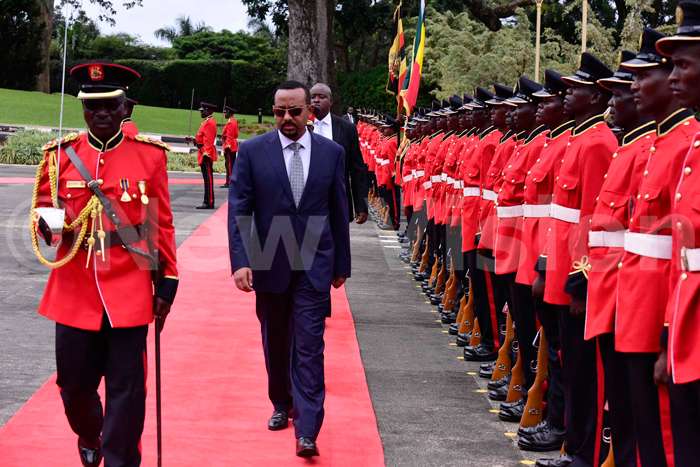
Ethiopian Prime Minister Abiy Ahmed inspecting a guard of honour during his State Visit to Uganda on June 08, 2018
Abiy Ahmed Ali is the first Ethiopian to be awarded a Nobel Prize. This year's prize is also the 100th Nobel Peace Prize.
Why Ethiopian PM won the Nobel Peace Prize
The son of poor villagers, a spy boss and now the man behind dizzying attempts to reform Africa's fastest-growing economy and heal wounds with Ethiopia's neighbours, Abiy Ahmed, has seen an unpredictable and perilstrewn rise to fame. Another chapter was added to his remarkable tale on Friday when he was awarded the Nobel Peace Prize.
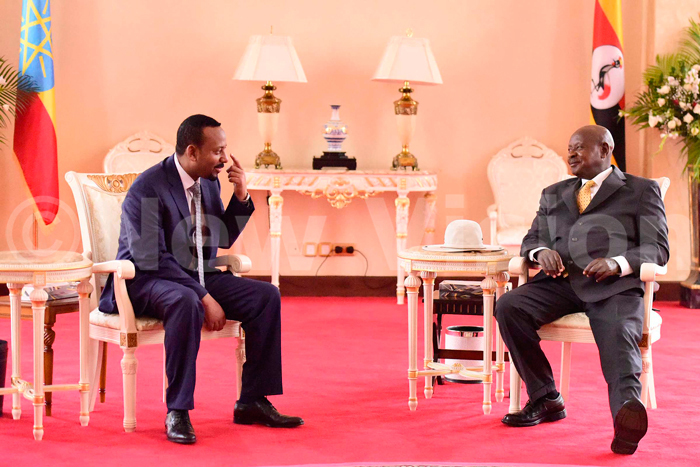
Ethiopian Prime Minister Abiy Ahmed with President Yoweri Museveni at State House Entebbe on June 8, 2018
Since becoming the Ethiopian prime minister in April last year, the 43-year-old has aggressively pursued policies that have the potential to upend his country's society and reshape dynamics beyond its borders.
Within just six months of his swearing-in, Abiy made peace with bitter foe Eritrea, released dissidents from jail, apologised for state brutality and welcomed home-exiled armed groups branded "terrorists" by his predecessors.
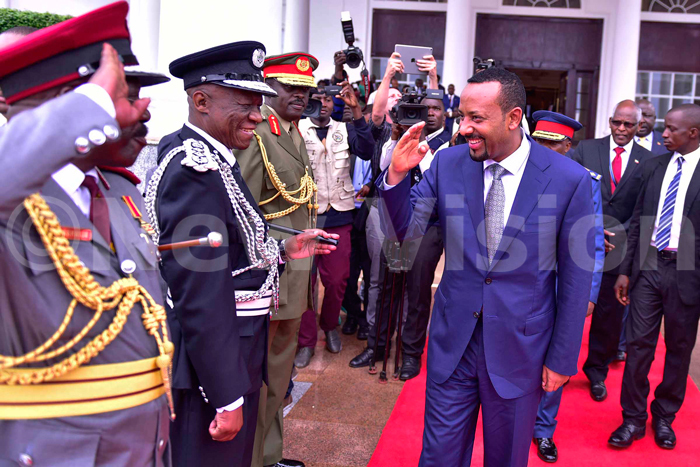
Ethiopian Prime Minister Abiy Ahmed being welcomed at State House Entebbe during his visit to Uganda on June 8, 2018
More recently, he has turned to fleshing out his vision for the economy, while laying the groundwork for elections, scheduled to take place next May. However, analysts fret that his policies are much too fast for the political old guard, and too little too late for the country's angry youth, whose protests swept him to power.
Despite the challenges, Abiy's allies predict his deep well of personal ambition will prompt him to keep swinging big. Tareq Sabt, a businessman and friend of Abiy's, says one of the first things that struck him when they met was the prime minister's drive.
SLEEPING ON FLOOR
Born in the western town of Beshasha to a Muslim father and Christian mother, Abiy "grew up sleeping on the floor" in a house that lacked electricity and running water.
"We used to fetch water from the river," he said in a radio interview with Sheger FM last month, adding that he did not even see electricity or an asphalt road until the seventh grade.
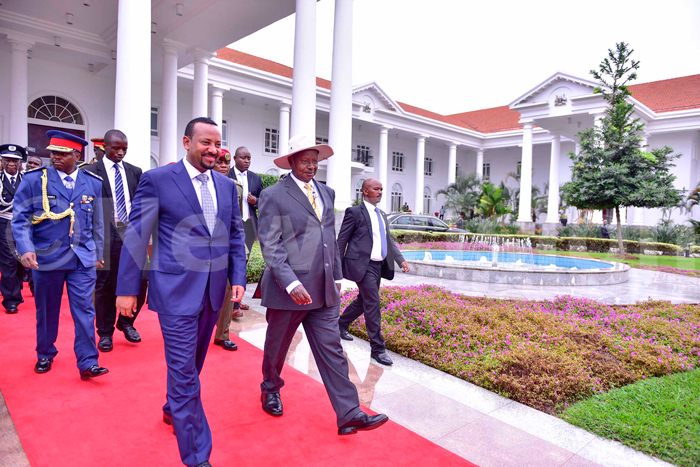
Ethiopian Prime Minister Abiy Ahmed with President Museveni at State House Entebbe during his visit to Uganda on June 8, 2018
Yet Abiy progressed quickly through the power structures created by the ruling coalition, the Ethiopian People's Revolutionary Democratic Front (EPRDF) after it took power from the Derg military junta in 1991.
Fascinated with technology, he joined the military as a radio operator while still a teenager. He rose to lieutenant-colonel, before entering government, first as a securocrat — he was the founding head of Ethiopia's cyber-spying outfit, the Information Network Security Agency. He than became a minister in the capital Addis Ababa and a party official in his home region of Oromia.
SEIZING THE MOMENT
The circumstances that led to Abiy's ascent to the high office can be traced to late 2015. A government plan to expand the capital's administrative boundaries into the surrounding Oromia region was seen as a land grab, sparking protests led by the Oromo, Ethiopia's largest ethnic group and the Amhara people.
States of emergency and mass arrests — typical EPRDF tactics — worked to quell the protests, but failed to address the underlying grievances. When than-prime minister Hailemariam Desalegn abruptly resigned, many feared a power struggle within the EPRDF, or even an unravelling of the coalition that would leave a dangerous vacuum.
Instead, the coalition's member parties chose Abiy to become the first Oromo prime minister. "He is the only one that could have saved the EPRDF," said Mohammed Ademo, a journalist who accompanied Abiy on his first visit to the large Ethiopian diaspora community in the US last year.
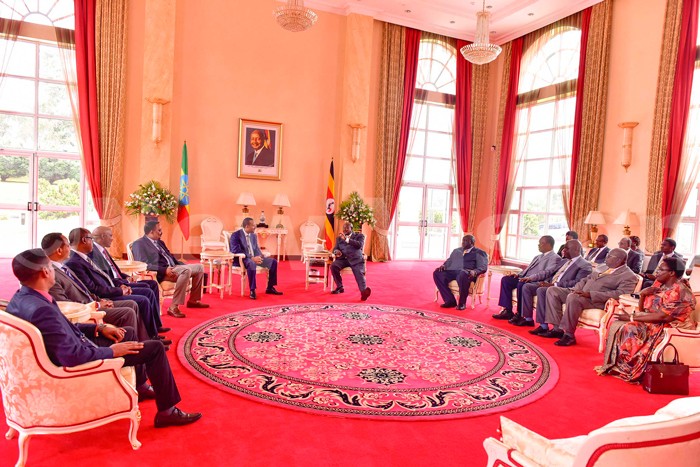
Ethiopian Prime Minister with his delegation at State House during his State Visit to Uganda on June 8, 2018
As prime minister, Abiy has sought to shape events across the Horn of Africa, fuelling criticism that he is taking on too much at once.
Beyond the rapprochement with Eritrea, for which he was cited for the Nobel Prize, he has played a leading role in mediating Sudan's political crisis and has also tried to revive South Sudan's uncertain peace deal. Yet whether any of these initiatives will ultimately succeed is an open question.
Even the Eritrea deal, which many see as Abiy's signature achievement to date, has been undermined by a lack of tangible progress on critical issues like border demarcation.
"Abiy has had real foreign policy successes, but there have been some misguided optimism from abroad that he can transform the Horn of Africa," said James Barnett, an analyst specialising in East Africa at the American Enterprise Institute.
"The Horn is volatile. I am skeptical that one leader can undo decades of competition and mistrust," he added.
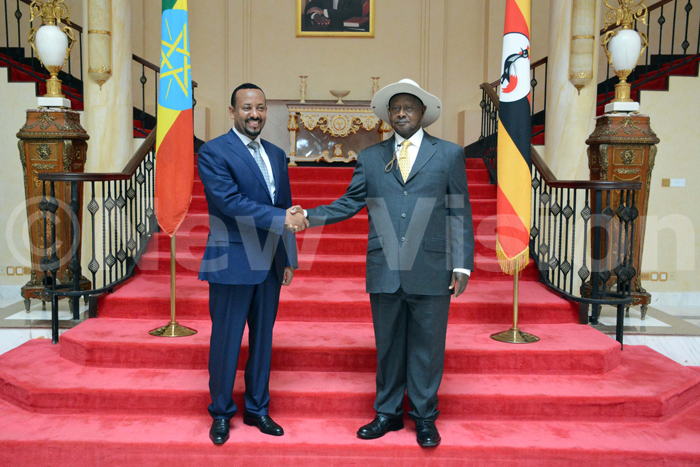
Ethiopian Prime Minister Abiy Ahmed shaking hands with President Museveni at State House Entebbe during his visit to Uganda on June 8, 2018
ASSASSINATION BID
The immediate demands of Ethiopian politics might force Abiy to shift his focus inward in the months to come. Holding credible elections by next May, the current timeline is a daunting task, yet Abiy is keen on scoring the kind of victory that would give him a mandate with the general public.
First, he must contend with Ethiopia's formidable security challenges. Ethnic violence has been on the rise in recent years, causing Ethiopia to record more internally displaced people last year than any other country.
And last June, Abiy faced the greatest threat yet to his hold on power when gunmen assassinated high-ranking officials, including a regional president and the army chief.
Abiy seems well aware of the danger he faces, and from time to time to time makes public reference to attempts on his life, including a grenade attack at a rally two months after he took his post.
Other African laureates;
Nelson Mandela: Literature 1993
For his work for the peaceful termination of the apartheid regime, and for laying the foundations for a new democratic South Africa. Nelson Mandela shared the Peace Prize with the man who had released him, President Frederik Willem de Klerk because they had agreed on a peaceful transition to majority rule.
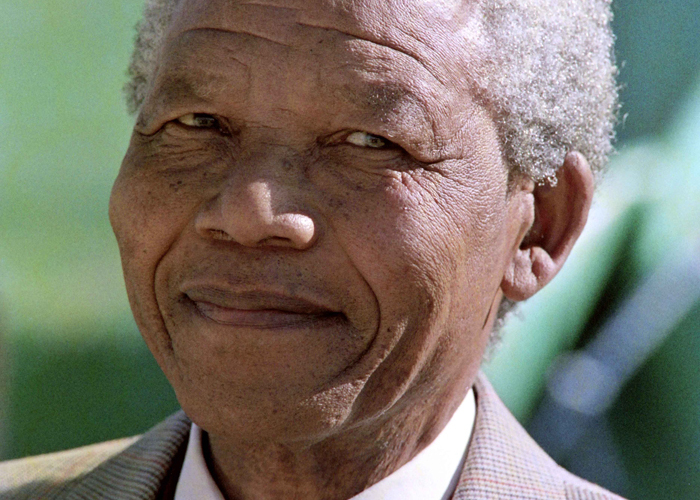
Mandela
Wangari Maathai 2004: Literature 1993
Kenyan environmentalist Wangari Maathai won the 2004 Nobel Peace Prize, becoming the first African woman to be given the prestigious award for her contribution to sustainable development, democracy, and peace.
The Norwegian Nobel Committee praised Ms. Maathai for leading a campaign to plant tens of millions of trees across Africa to slow deforestation. She founded the Green Belt Movement where, for nearly thirty years, she has mobilized poor women to plant 30 million trees.
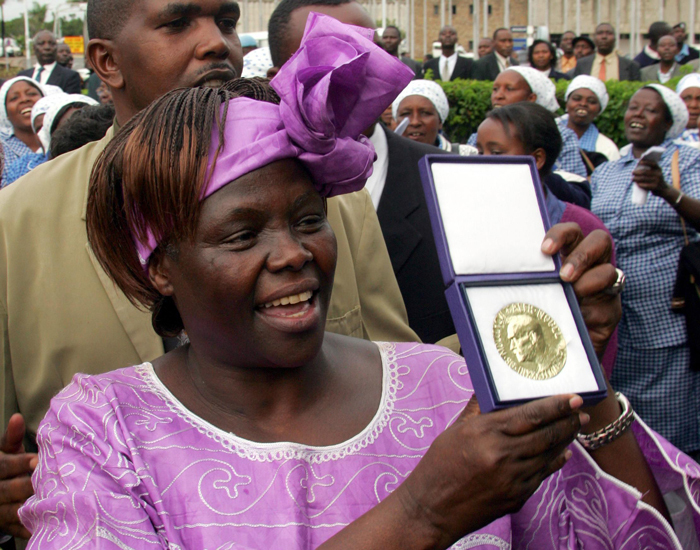
Wangari
Archbishop Desmond Tutu: Literature 1984
Desmond Tutu is one of South Africa's most well-known human rights activists, winning the 1984 Nobel Peace Prize for his efforts in resolving and ending apartheid. Desmond Tutu continues to travel extensively, championing human rights and the equality of all people, both within South Africa and internationally.
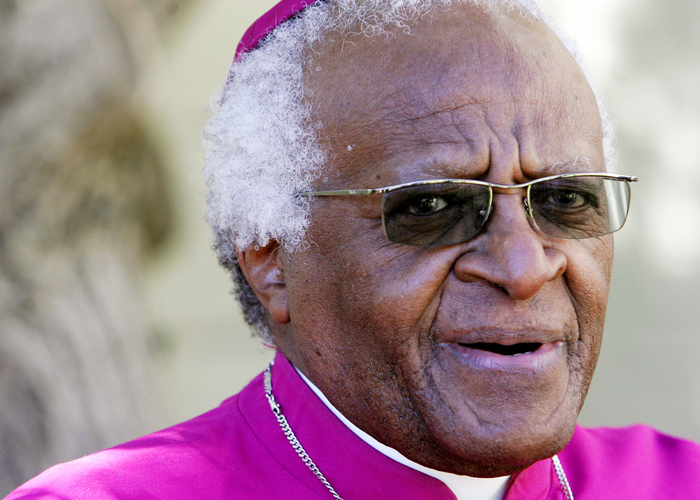
Desmond Tutu
Kofi Annan: Literature 2001
For his work for a better organized and more peaceful world. Kofi Atta Annan was a Ghanaian diplomat who served as the seventh Secretary-General of the United Nations from January 1997 to December 2006.
Annan and the UN were the co-recipients of the 2001 Nobel Peace Prize. He was the founder and chairman of the Kofi Annan Foundation, as well as chairman of The Elders, an international organization founded by Nelson Mandela.
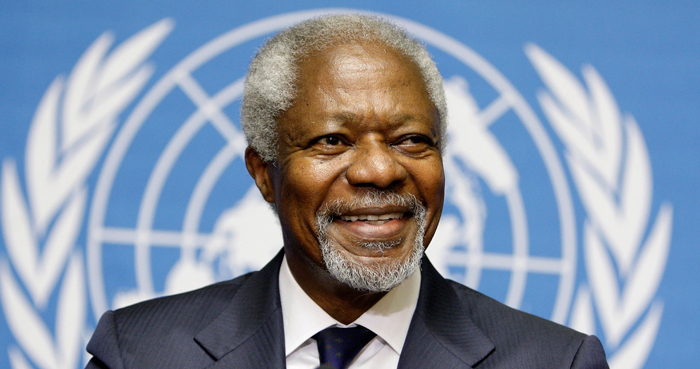
Kofi Anan
Denis Mukwege: Literature 2018
DRC's Denis Mukwege for his efforts to end the use of sexual violence as a weapon of war and armed conflict. He is a Congolese gynecologist and Pentecostal pastor. He founded and works in Panzi Hospital in Bukavu, where he specializes in the treatment of women who have been raped by armed rebels. In 2018, Mukwege and Iraqi Yazidi human rights activist Nadia Murad were jointly awarded the Nobel Peace Prize.
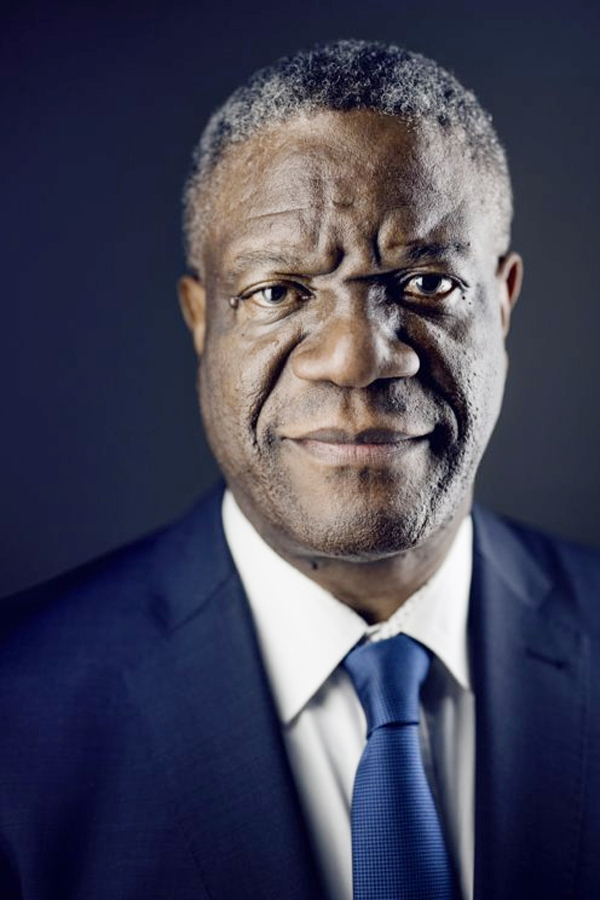
Mukwege
Wole Soyinka: Literature 1986
Nigerian writer Wole Soyinka was awarded the Nobel Prize for Literature in 1986, becoming the first African laureate. He was described as one "who in a wide cultural perspective and with poetic overtones fashions the drama of existence".
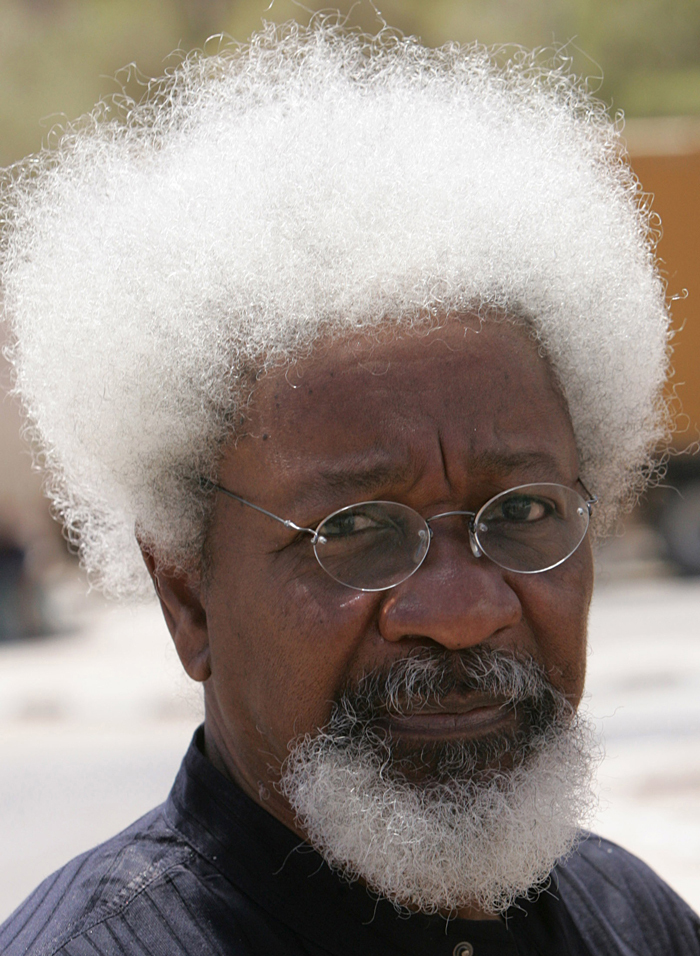
Soyinka
The Nobel Peace Prize is one of the five Nobel Prizes established by the will of Swedish industrialist, inventor, and armaments manufacturer Alfred Nobel, along with the prizes in Chemistry, Physics, Physiology or Medicine, and Literature. Since March 1901, it has been awarded annually (with some exceptions) to those who have "done the most or the best work for fraternity between nations, for the abolition or reduction of standing armies and for the holding and promotion of peace congresses.
Quick facts
-
Peace prizes: 100
-
Peace laureates: 134
-
Awarded women: 17
-
Youngest laureate: 17
-
Oldest laureate: 87
Source; nobelprize.org